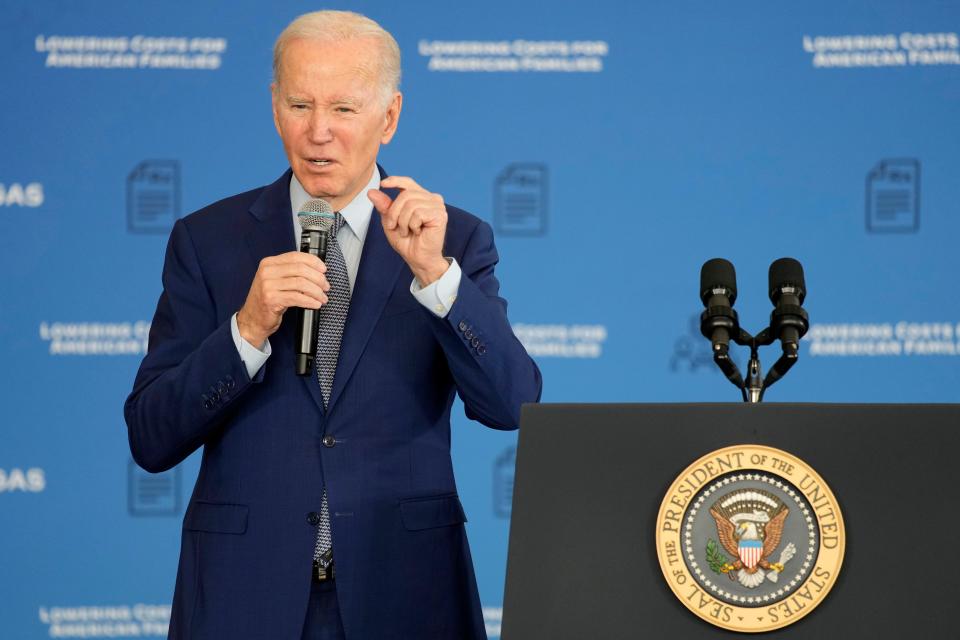Is it a bank bailout? On SVB, White House fights comparisons to 2008 as Biden confronts bank crisis
- Oops!Something went wrong.Please try again later.
WASHINGTON – The White House is working to avoid any mention of a "bailout" as President Joe Biden defends his actions to rescue depositors of two failed banks to avert a large-scale financial crisis.
But Republican critics and some economists said that's effectively what the Biden administration executed by stepping in to guarantee that depositors at Silicon Valley Bank and Signature Bank are paid in full following the banks' collapses.
"Bailout" became an unpopular word in politics during the financial crisis of 2008 when President George W. Bush and Congress purchased failing assets of big banks and other financial institutions ahead of the Great Recession. Many Americans responded angrily, accusing billionaire executives of getting taxpayer-funded handouts in exchange for their own poor decisions.
Officials in the Bush and Obama administrations said the 2008 intervention was needed to prevent an even larger catastrophe that would have harmed a wide swath of American households.
Fifteen years later, Biden is fighting comparisons to 2008 as he looks to ease Americans' concerns about the stability U.S. banking system.
The latest
Stocks fall: The stock market finished lower Wednesday part pared some of the earlier losses that were triggered by renewed fears of a banking crisis. The S&P 500 was down about 0.7 % and the Dow Jones Industrial Average was down 281 points or 0.87%.
Extraordinary action: The Federal Reserve, the Treasury Department and the Federal Deposit Insurance Corporation took the extraordinary step this week of guaranteeing the deposits at Silicon Valley Bank and Signature Bank after regulators closed both. SVB had $175 billion in deposits. Signature had $89 billion.
How it works: Money to pay back depositors will come from the Deposit Insurance Fund, which is funded primarily by fees assessed to banks, though it is backed by the full faith and credit of the U.S. government. The fund traces back to President Franklin D. Roosevelt's New Deal after the Great Depression to protect depositors when their banks fail.
More: Silicon Valley Bank collapse explained in graphics

Why the White House says, 'This is not a bailout'
A bailout generally refers to government assistance to ensure that a financial institution or company doesn't collapse or go bankrupt.
Biden cited the source of the rescue money – bank premiums and interest earned on funds invested in U.S. government obligations – to argue his administration's strategy is not a bailout because taxpayers aren't on the hook.
"Let me repeat that: No losses will be borne by the taxpayers," Biden said Monday.
More: 'It's a wake-up call': Advocacy groups, lawmakers highlight law they say led to SVB collapse
In addition, Biden stressed that the banks' investors are not protected and their management will be fired.
In contrast, with the bank bailout of 2018, the banks themselves were rescued with the government taking equity stake. Congress voted to authorize the Treasury Department to buy up $700 billion in toxic assets from failed banks – a very different arrangement than Biden's plan.
"This is not a bailout," White house press secretary Karine Jean-Pierre said. "This is not 2008 at all."

What do economists say?
Most economists said Biden's intervention is not a bailout in the traditional sense.
"I don't think making sure depositors are made whole is a bailout," said Mark Zandi, chief economist at Moody’s Analytics, noting the banks' shareholders are getting wiped out, owners are losing money and management are out of jobs. "I wouldn't call this a bailout. I would call this sensible policy."
Republicans have slammed Biden's actions as a "bailout." Sen. Josh Hawley, R-Mo., said the Biden administration "has found a way to make taxpayers pay for a bailout without taking a vote on it."
"Of course it's a bailout," said New Hampshire Gov. Chris Sununu, arguing the banks' depositors should have been more mindful of the risks. "They chose to put all their money into one bank that was making horrendous decisions, close their eyes and lost their money."
Yet even some on the left say it's a fair label.
More: Was Silicon Valley Bank too 'woke'? Why Republicans blame collapse on 'diversity demands'
"Yes, it was a bailout," said Paul Krugman, a liberal economist and New York Times columnist, writing that the source of the funds "doesn’t change the reality that the government came in to rescue depositors who had no legal right to demand such a rescue."
Neil Barofsky, who oversaw the bank bailout, known as the Troubled Asset Relief Program, for the Bush and Obama administrations, told NPR, "If your definition is government intervention to prevent private losses, then this is certainly a bailout."
Reach Joey Garrison on Twitter @joeygarrison.
This article originally appeared on USA TODAY: Banking crisis 2023: Biden fights 'bailout' comparisons to 2008

